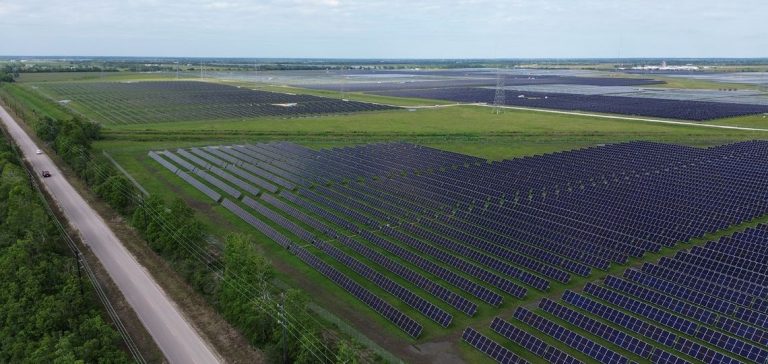TotalEnergies has recently commissioned two large-scale solar power plants in Texas, Danish Fields and Cottonwood, representing a total installed capacity of 1.2 gigawatts (GW). These installations, located in southeast Texas, are designed to supply electricity to industrial clients through long-term Corporate Power Purchase Agreements (CPPA). The uniqueness of these sites lies in their integration of battery storage systems, which enhance the management of solar power intermittency and meet the variable energy demand of the local grid.
The Danish Fields plant, with its 720 megawatts peak (MWp), is now TotalEnergies’ largest solar installation in the North American market. It includes 1.4 million photovoltaic panels spread over several hundred hectares, along with a 225 MWh storage system, developed by Saft, a subsidiary specializing in battery solutions. This system helps stabilize the grid and offset the fluctuations in solar energy production. In comparison, the Cottonwood plant, with a capacity of 455 MWp, is equipped with 847,000 photovoltaic panels and will also incorporate a storage system of the same capacity (225 MWh) upon its full commissioning scheduled for 2025.
TotalEnergies is following a strategy to diversify its renewable asset portfolio, particularly in the Texas market, which is both competitive and rapidly evolving. The Danish Fields and Cottonwood projects will primarily supply electricity at fixed prices under long-term contracts with industrial clients, a model increasingly favored by companies seeking to stabilize their energy costs. Danish Fields, for instance, has already secured 70% of its production through CPPAs, while the remaining 30% will support the decarbonation of TotalEnergies’ industrial facilities along the Gulf Coast region.
These new solar capacities align with the current dynamics of the Texas grid, managed by the Electric Reliability Council of Texas (ERCOT), which aims to increase the share of renewables in the energy mix. The addition of battery storage capacities strengthens grid flexibility, a crucial factor in a region where extreme weather events regularly disrupt power supply.
Globally, TotalEnergies currently owns 24 GW of installed renewable capacities, including wind, solar, and batteries. The group aims to increase this figure by 11 GW by 2025, positioning itself among the most active players in the energy transformation of major energy companies. By 2030, TotalEnergies plans a net electricity production of 100 terawatt-hours (TWh), of which around 70% will come from renewable sources, with the remaining portion generated by gas-fired plants.
The development of projects like Danish Fields and Cottonwood directly contributes to achieving these objectives by increasing the share of low-carbon assets in the group’s portfolio. By securing long-term sales contracts with companies, TotalEnergies also ensures a stable and predictable revenue stream, mitigating the risks associated with energy price volatility in the spot markets.
The State of Texas, traditionally associated with oil and gas production, is experiencing a rapid transformation of its energy landscape. Massive investments in renewables, particularly in solar and wind power, respond to a growing demand for low-carbon energy solutions. ERCOT, the grid operator, plays a key role in this transition by reorganizing its infrastructure to integrate these new intermittent power sources.
The development of Danish Fields and Cottonwood by TotalEnergies fits into this broader context of profound market transformation in Texas. With a power grid already under pressure during consumption peaks, the addition of storage capacities helps better manage system stability. This gives TotalEnergies a competitive edge in this rapidly growing market, where infrastructure flexibility and resilience are becoming critical differentiation factors.






















